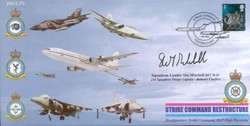JS(CC)71b RAF cover for the restructuring of Strike Command into No 1 Group, 2 Group and 3 Group with artwork showing BAe Harrier , Tornado and Lockheed Tristar aircraft. The cover bears 1st class stamp cancelled with Strike Command Restructure cachet dated 1 April 2000 depicting Vickers VC10 Nimrod and Jaguar aircraft.
No 1 Group was enlarged to include the Tornado F3 units from the former No11/18 group and operates all the Royal Air Force front line fast jet aircraft (excluding the Harrier) it therefore operates Canberra Hawk Jaguar and Tornado aircraft.
No 2 Group controls all aircraft and force elements that support front line operations, including former No 38 Group air transport and AAR assets and also the Nimod R and Sentry E3-D from the former No 11/18 Group as well as RAF Regiment and ground based Defence Systems. It therefore opertates the BAe 125 BAe 146 Herclues Nimrod R Sentry Squirrel Tristar and VC10 aircraft.
No 3 Group is formed of the Joint Harrier Force (including both the Navy and RAF Harriers) it also operates the Nimrod Maritime Patrol Aircraft and Search and Rescue (SAR) Sea King helicopters.
Cover has been flown in VC10K2, ZA144, of No 101 Squadron on the flypast for the Strike Command inaugural ceremony. Reflown in Tristar K1 ZD951 of No 216 Squadron on a North Sea Towline sortie refuelling Strike Command Harrier, Jaguar and Tornado aircraft.
Signed by Squadron Leader Stu Mitchell DFC RAF
200 Numbered and Certified on reverse
Cover size 210mm x 110mm
Squadron Leader Stu Mitchell DFC RAF, flew the covers and was awarded the Distinguished Flying Cross during the Balkans Conflict - the only Tristar pilot ever to be awarded the DFC. He was awarded the Distinguished Flying Cross for gallantry in operations, having taken his Tristar aircraft and crew well inside hostile airspace to refuel a fighter which was critically short of fuel during the campaign over Kosovo in 1999. Naturally flying a large unarmed relatively slow moving airliner carrying extra aircraft fuel - painted white with Royal Air Force written on the side - the danger was very real.

